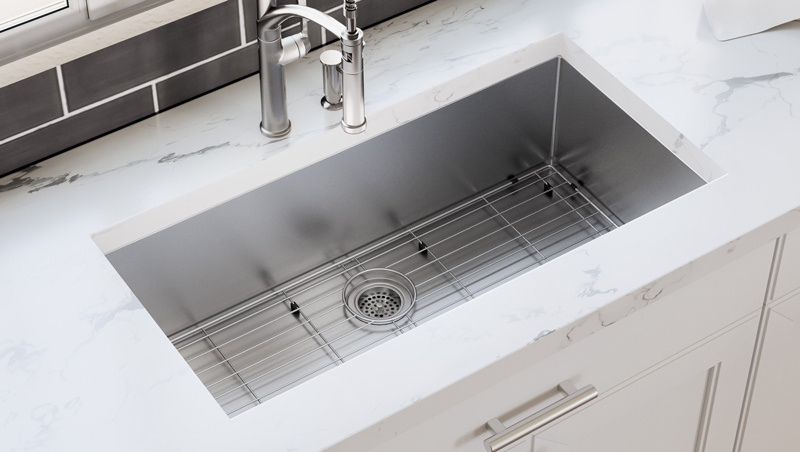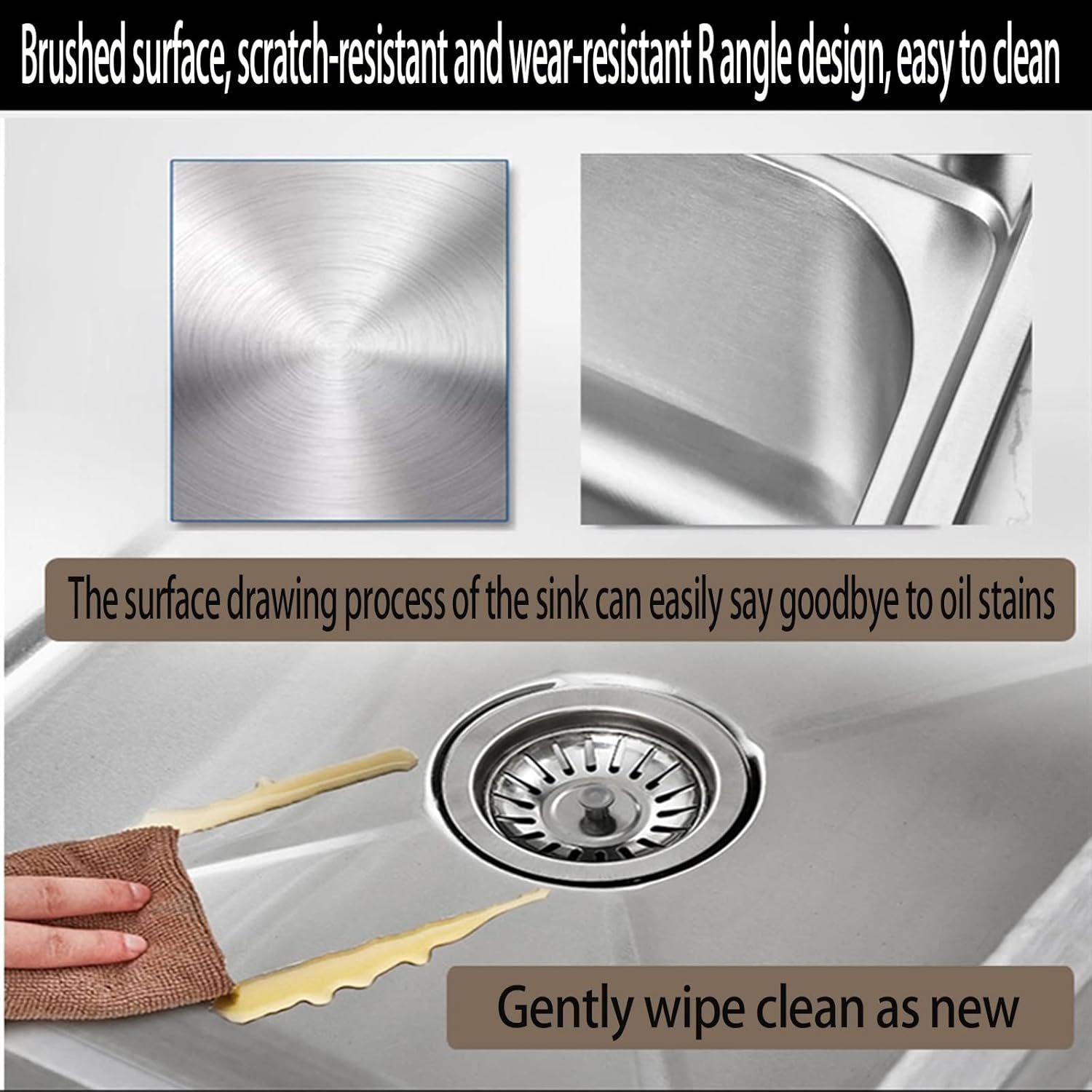城乡建设与生活
服务商
city & town developer &
service provider
-
-
-
-
News
-
Contact
07
2025
-
01
What is the Life Expectancy of a Kitchen Sink?



Introduction
Your kitchen sink is one of the most frequently used features in your home, but how long can you expect it to last? From washing dishes to prepping food, the sink endures heavy daily use. Understanding its life expectancy can help you plan for future upgrades and ensure your kitchen stays functional and stylish. Let’s explore how long a kitchen sink typically lasts, the factors that impact its lifespan, and how to extend its life.

Factors Affecting the Life Expectancy of a Kitchen Sink
Material of the Sink: The material of your kitchen sink plays a significant role in determining how long it will last. Here are some common materials and their lifespans:
Stainless Steel Sinks:
Known for their durability and resistance to rust, stainless steel sinks can last anywhere from 30 to 50 years with proper care. The quality of the steel and gauge thickness (16 or 18-gauge being ideal) can further impact longevity.
Granite Composite Sinks:
These sinks are a blend of natural stone and acrylic, offering both durability and a premium look. With proper maintenance, a granite composite sink can last 30 years or more. It’s highly resistant to scratching, chipping, and heat.
Porcelain Sinks:
Porcelain or ceramic sinks can have a shorter lifespan, often lasting 10-15 years. While they are beautiful and offer a classic aesthetic, they can be prone to chips and cracks if heavy objects are dropped on them.
Fireclay Sinks:
Fireclay is another durable material, similar to porcelain but stronger. Fireclay sinks can last up to 30 years if well-maintained. They are highly resistant to stains, scratches, and impacts, making them a reliable choice.

Usage and Maintenance:
How you use and care for your sink plays a huge part in determining its longevity. A kitchen sink that’s constantly exposed to harsh chemicals or subjected to heavy use can wear out faster than one that’s cleaned and maintained regularly. To extend the life of your sink:
| Avoid using abrasive cleaning pads or harsh chemicals that could scratch or damage the surface. |
| Regularly clean and dry your sink to prevent buildup of grime, soap scum, and mineral deposits. |
| Always use sink mats or trivets when placing hot pots and pans to avoid damaging the surface. |
| Installation Quality: Proper installation is crucial for ensuring the long life of your sink. Poor installation, such as improper sealing or misalignment, can lead to leaks, rust, and other issues. It’s important to have a professional install your sink to avoid costly damage down the road. |
How to Extend the Life of Your Kitchen Sink
 While all sinks will eventually show signs of wear, there are several proactive steps you can take to help your sink last longer:
While all sinks will eventually show signs of wear, there are several proactive steps you can take to help your sink last longer:
Regular Cleaning:
Clean your sink regularly with a mild soap solution to avoid buildup of grease, food particles, and minerals. For stainless steel, use a non-abrasive cleaner and soft cloth to maintain its finish.
Drying the Sink:
After each use, wipe down your sink to prevent water spots and mineral stains, especially in areas with hard water.
Avoid Dropping Heavy Items:
Dropping pots, pans, or heavy objects into the sink can cause chips, cracks, and other damage. Always handle fragile or heavy items with care when using the sink.
Use a Drain Protector:
Installing a drain protector helps prevent large food particles from clogging your pipes and reduces the likelihood of damage caused by blockages.
Signs It’s Time to Replace Your Kitchen Sink
Even the most durable sinks will eventually reach the end of their life. Here are some signs that it might be time to replace your kitchen sink:
Visible Cracks or Chips:
Cracks or chips can lead to leaks and further damage, especially in porcelain or fireclay sinks.
Corrosion or Rusting:
Rust is a major concern for sinks, especially stainless steel ones. If your sink is showing signs of significant rusting, it may be time for a replacement.
Frequent Leaks:
If you’re noticing frequent leaks or water damage around your sink, it could be a sign that the sink or the installation is compromised.
Outdated or Unattractive Appearance:
If your sink is outdated or no longer complements your kitchen’s design, replacing it can give your space a fresh look.
Conclusion
The life expectancy of your kitchen sink depends largely on the material, usage, and maintenance. Stainless steel sinks can last up to 50 years, while other materials like porcelain and granite composite have a slightly shorter lifespan but still provide excellent durability. Proper care, regular cleaning, and avoiding excessive wear can all help extend the life of your sink.
If you’ve noticed signs of wear, such as chips, rust, or leaks, it may be time to replace your sink with a new, durable option that better suits your kitchen needs. Always consider material, size, and design when choosing a replacement to ensure it matches your aesthetic and functional requirements.
Article is for reference only. If there is any infringement, please contact me for removal!
undefined


@2024 All Rights BEST VIETNAM INDUSTRY CO.,LTD. Reserved.
PowerBy:300.cn SEO Privacy Policy
COOKIES
Our website uses cookies and similar technologies to personalize the advertising shown to you and to help you get the best experience on our website. For more information, see our Privacy & Cookie Policy
COOKIES
Our website uses cookies and similar technologies to personalize the advertising shown to you and to help you get the best experience on our website. For more information, see our Privacy & Cookie Policy
These cookies are necessary for basic functions such as payment. Standard cookies cannot be turned off and do not store any of your information.
These cookies collect information, such as how many people are using our site or which pages are popular, to help us improve the customer experience. Turning these cookies off will mean we can't collect information to improve your experience.
These cookies enable the website to provide enhanced functionality and personalization. They may be set by us or by third-party providers whose services we have added to our pages. If you do not allow these cookies, some or all of these services may not function properly.
These cookies help us understand what you are interested in so that we can show you relevant advertising on other websites. Turning these cookies off will mean we are unable to show you any personalized advertising.





